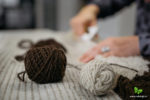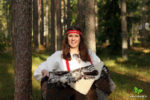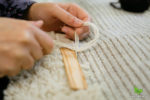TRADITIONAL FINNISH TEXTILE ART WORKSHOP
GENERAL INFORMATION
Package type: half day
Season: January–December
For whom: groups (min. 5–max. 10 pers.)
Services included: materials and guidance
Duration of the programme: 2 hours
Type of transport: private transport / taxi / public transport
LOCATION
Address: Iltamaa, Lohja region
Distance from the capital: Helsinki 60 km
Hostess: Jenni Vanhanen
Contact details:
T.: +358 45 783 44445
E-mail: jenni@iltamaa.fi
This workshop will take place at the Kettukallio Experience farm situated in the Finnish countryside, some 20 minutes’ drive from the city of Lohja and surrounded by a beautiful Finnish forest. An alternative option is to have this Textile Art workshop at a local Yarn Shop Vaudevilla in the heart of Lohja. The shop is full of colourful textile materials to see and buy.
Traditional Finnish textile art, called Ryijy, is on the intangible cultural heritage list of Finland. Traditionally, ryijys, which are knotted-pile textiles, have been used as large blankets, wall hangings or seat covers. Ryijys were normally woven on a loom or sewn on a base fabric. Nowadays ryijys are made in a range of sizes to suit their intended purpose and a wide variety of materials can be used. The ryijy tradition is being passed on through teaching as well as by thousands of enthusiasts and techniques for making ryijys can also be learned through social media.
Finnish wool and handcraft is Jenni’s enthusiasm. She became a textile artisan when, after working as an IT engineer for over 20 years, she wanted to change her life and became inspired by Finnish nature and traditions. She was nominated as Artisan of The Year in Finland for keeping up the traditional handicraft art. Jenni speaks Finnish, English, Swedish, Italian and German. The main language during the workshop is Finnish or English.
Workshop participants will learn about real Finnish traditions and will learn how to make Finnish textile rugs.
- The story of ryijy.
- Introduction to equipment and materials.
- Selecting your design from a range of readymade designs.
- Learning how to sew a ryijy
- Working on one’s own piece of material.
- Learning how to use, clean and maintain the ryijy traditional textile.






